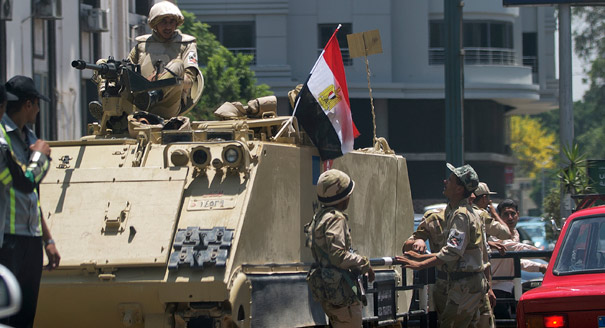The hyper-personalized new version of global sphere-of-influence politics that Donald Trump wants will fail, as it did for Russia. In the meantime, Europe must still deal with a disruptive former ally determined to break the rules.
Thomas de Waal
{
"authors": [
"Judy Dempsey"
],
"type": "commentary",
"blog": "Strategic Europe",
"centerAffiliationAll": "",
"centers": [
"Carnegie Endowment for International Peace",
"Carnegie Europe"
],
"collections": [],
"englishNewsletterAll": "",
"nonEnglishNewsletterAll": "",
"primaryCenter": "Carnegie Europe",
"programAffiliation": "",
"programs": [],
"projects": [],
"regions": [
"Southern, Eastern, and Western Africa"
],
"topics": [
"Security"
]
}
Source: Getty
Every week leading experts answer a new question from Judy Dempsey on the foreign and security policy challenges shaping Europe’s role in the world.
Every week leading experts answer a new question from Judy Dempsey on the foreign and security policy challenges shaping Europe’s role in the world.
On a rhetorical level, Egypt is already in a state of civil war. Various actors use extremely incendiary language, delegitimize opponents (with terms like fascist, apostate, and terrorist tossed around with abandon), and eschew any compromise or conciliatory talk.
But while there are danger signs, I do not think real civil war is imminent. Although divisions are deep, they do not coincide with linguistic, ethnic, or geographical cleavages, but cut down the middle of neighborhoods—and sometimes even families. Egypt is a society where violence has rarely been used on a large scale and indeed still shocks people, though that is beginning to fray. Arms are widely available, but various camps are not forming militias or paramilitary groups. State institutions still function.
As I write these lines, I see no signs that cooler heads and softer voices are playing any role, and that is worrying indeed. But the end result might be civil strife, harsh repression, and embittered politics rather than full-scale civil war.
This is no coup, and Egypt is not going to face a civil war.
A coup would have come as a surprise, not after months of popular grievances against the Muslim Brotherhood’s authoritarian practices. A coup would not have been preceded by a 30-million-strong nationwide demonstration. The Egyptian people are extremely frustrated with a leadership that didn’t just fail to deliver economically, but that polarized the country, undermined social cohesion, diluted democratic transformation, and acted irresponsibly on issues of national security. The Muslim Brotherhood’s totalitarian practices have overridden any legitimacy that Egypt’s first democratically elected president claimed to have. It has to be clear that the source of legitimacy is the people.
The Egyptian people are restoring their stolen revolution. Egypt may have been very close to a civil war if it hadn’t been for the country’s military. The army intervened to ensure the security of the mass protests as well as Egypt’s national integrity, which appeared to be on the brink of collapse. The protests weren’t going to produce any substantive outcome without a patriotic stance from Egypt’s military. Together, the protestors and the army confronted a regime that was aided by irregular militias and that intimidated the Egyptian people with militant jihadists and ex-terrorists.
The Muslim Brotherhood’s current attempts to present themselves as victims, especially in the U.S. media, do not reflect the reality on the ground. On the one hand, the number of protestors supporting ousted president Mohamed Morsi are shrinking, and their violent methods of provoking the military are becoming less successful. On the other, the protests by Egyptians determined to hold on their revolution continue, and the commitment of the military and political forces to achieving a peaceful, inclusive national conciliation remains high. Together, these factors significantly reduce the potential for a civil war.
Egypt’s coup does not have to lead to civil war, but what happens now depends on the Muslim Brotherhood.
When in 1974 the Portuguese army overthrew a disliked authoritarian government, the world hailed the “coup” as a bold move to establish democracy in Portugal. Now in Egypt, it is clear that the Muslim Brotherhood was paying lip service to democracy to win power, only to then kill it off by refusing all the compromises essential to make democratic government work.
In 1997, Islamist militants seized 60 tourists near Luxor, mainly Swiss who were enjoying ancient Egyptian culture, and butchered them in the name of Islamist ideology. Some were beheaded. The man believed to be responsible for the atrocity was appointed in 2013 by then president Mohamed Morsi as the governor of Luxor. Such cynical promotion of evil shocked all decent Egyptians—as did the Muslim Brotherhood’s arrests, torture, and suppression of media freedom.
Whether Egypt now descends into civil war depends on the Muslim Brotherhood. The Islamist party can turn away from nondemocracy and violence, or else splinter into various Salafist jihadist groups. The army must organize new elections soon and accept that civil society has a right to criticize. Egypt is slowly being Pakistanized as military and mullahs jostle for power over a corrupt economy. This need not happen, but modern societies cannot live under religious autocracy. Egyptians have glimpsed a Muslim Brotherhood future and decided it does not work.
Military rule can give way to democracy—South Korea, Brazil, and Greece are modern examples. Hopefully, Egypt’s new, younger generals are working on a similar future for their country.
Egypt will remain in a state of turmoil for a long time to come. Whether such turmoil should be considered a civil war will be as controversial as it is unimportant: Egyptians will remain deeply divided. Until June 30, Islamists were in power, the military grudgingly tolerated them, and the secular opposition took to the streets. Now, secularists are in power with the backing of the military and Islamists are taking to the streets. The conflict will continue, no matter what we call it.
The best hope for Egypt would be a decision by the military, worried about the looming violence, to back down from its open support for the secular opposition and to become an honest broker between Islamists and secularists. This is the promise the military made when it called for a government of national unity staffed by technocrats. This is the promise it violated when it floated the name of Mohamed ElBaradei, the best-known representative of the secular opposition, to become prime minister. If the army can return to neutrality and hold elections, there is some hope.
If the military continues on a partisan course, the chances of Islamists and secularists finding some common ground are nonexistent. Conflict between the two sides will escalate, with moderates sidelined and the hotheads prevailing. The most threatening possibility is that the military itself will become divided. If that happens, all bets are off.
Egypt may be edging toward a civil war; its leaders should engage in serious and lasting dialogue to stop that from happening.
A year ago, hopes were that Egypt’s democratic election of a Muslim Brotherhood president would be an exemplary step toward the coexistence of diverse segments of a complex society.
This virtuous circle did not materialize. Former president Mohamed Morsi was accused of taking all the power for himself, while the Muslim Brotherhood lambasted the opposition for rejecting any form of dialogue. Meanwhile, the economy kept deteriorating and the hopes ignited by the 2011 revolution ended in delusion, bringing millions of opponents to the streets last month.
The military coup of July 3 was no surprise, since the army had long said that it would not let the country sink into irreparable chaos. The West was at a loss as to how to characterize the event, as illustrated by the New York Times’s description: “a forced change of power, which had the trappings of a military coup spurred by a popular revolt.” The tragic events in Cairo on July 7, when dozens of Morsi’s supporters were shot dead, only brought things closer to a civil war.
Clearly, the “ballot box only” solution didn’t work. But, despite all inclinations, and with the army remaining the centerpiece of the state, the only sensible way forward remains for all political leaders to engage with each other and to agree on a road map toward fresh elections. More polarization is not the solution.
A cultural civil war has been festering in the Arab world for the past few years.
Mesmerized by U.S. political scientist Samuel Huntington’s vision of a clash of civilizations—“us versus them”—we missed the real feud confronting “them.” Sunni against Shia, secular against religious, tolerant against fundamentalist, modernizing against traditionalist, global against local: the fabric of Arab society has been torn to shreds by differences, interests, and armies.
From Syria to Egypt, from Iran to Iraq, and from Gaza to Lebanon, the enemy is not “us” anymore, it is the neighbor. Huntington failed to observe the deeper undercurrents in our world, such as the botched liberal reforms in the early twentieth-century Islamic world and the age-old division between Sunni and Shia Muslims. Detonated by the invasion of Iraq and the so-called Arab Spring, those contradictions blew apart deeply entrenched establishments.
It was a delusion to think that “friendly” oligarchs like former Egyptian president Hosni Mubarak could go on forever. Now the real clash of civilization has begun: open systems versus closed systems.
Carnegie does not take institutional positions on public policy issues; the views represented herein are those of the author(s) and do not necessarily reflect the views of Carnegie, its staff, or its trustees.
The hyper-personalized new version of global sphere-of-influence politics that Donald Trump wants will fail, as it did for Russia. In the meantime, Europe must still deal with a disruptive former ally determined to break the rules.

Thomas de Waal
2026 has started in crisis, as the actions of unpredictable leaders shape an increasingly volatile global environment. To shift from crisis response to strategic foresight, what under-the-radar issues should the EU prepare for in the coming year?

Thomas de Waal
A renewal of relations between France and Turkey is vital to strengthen European strategic autonomy. To make this détente a reality, Paris and Ankara should move beyond personal friction and jointly engage with questions of Black Sea security.

Romain Le Quiniou
Europe is designing a new model of collective security that no longer relies on the United States. For this effort to succeed, solidarity between member states that have different threat perceptions is vital.

Erik Jones
Beset by an increasingly hostile United States, internal divisions, and the threat of Russian aggression, the EU finds itself in a make-or-break moment. U.S. President Donald Trump calls it a decaying group of nations headed by weak leaders. Is Europe able to prove him wrong?

Thomas de Waal